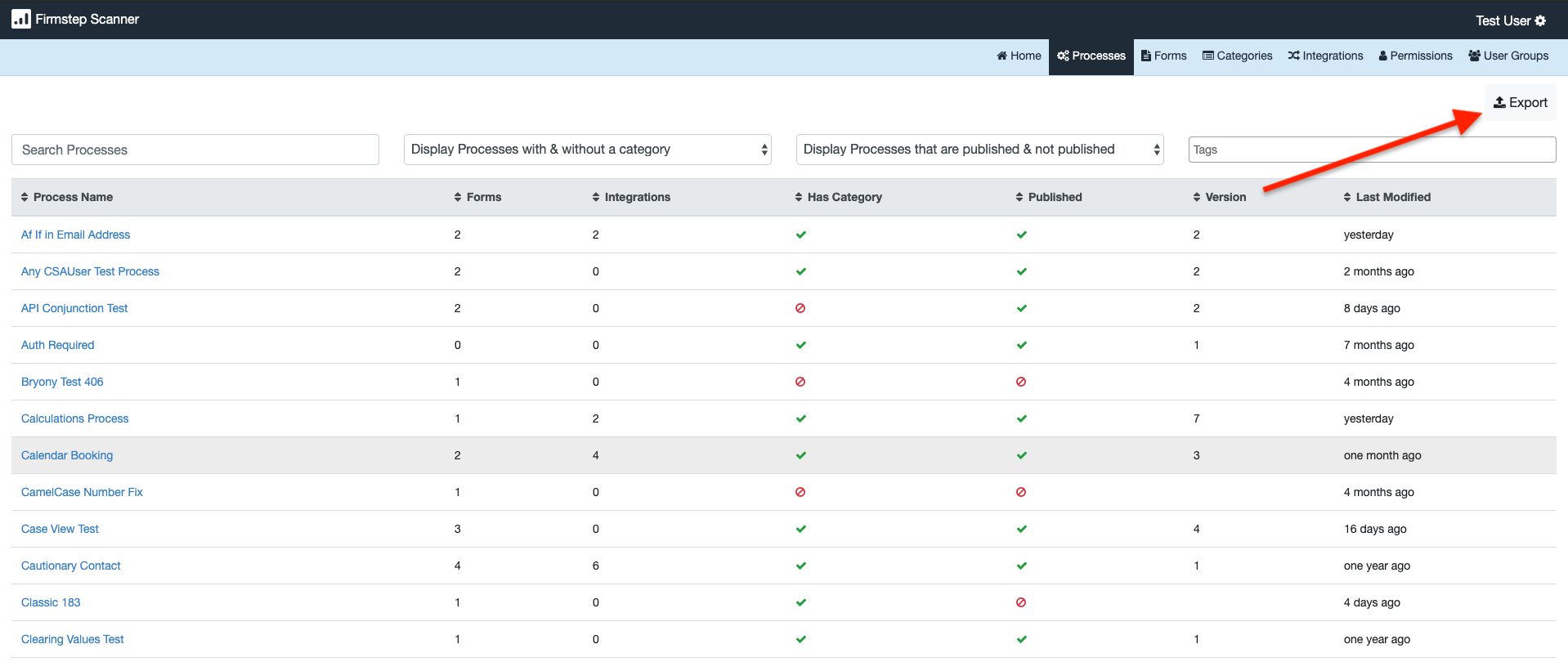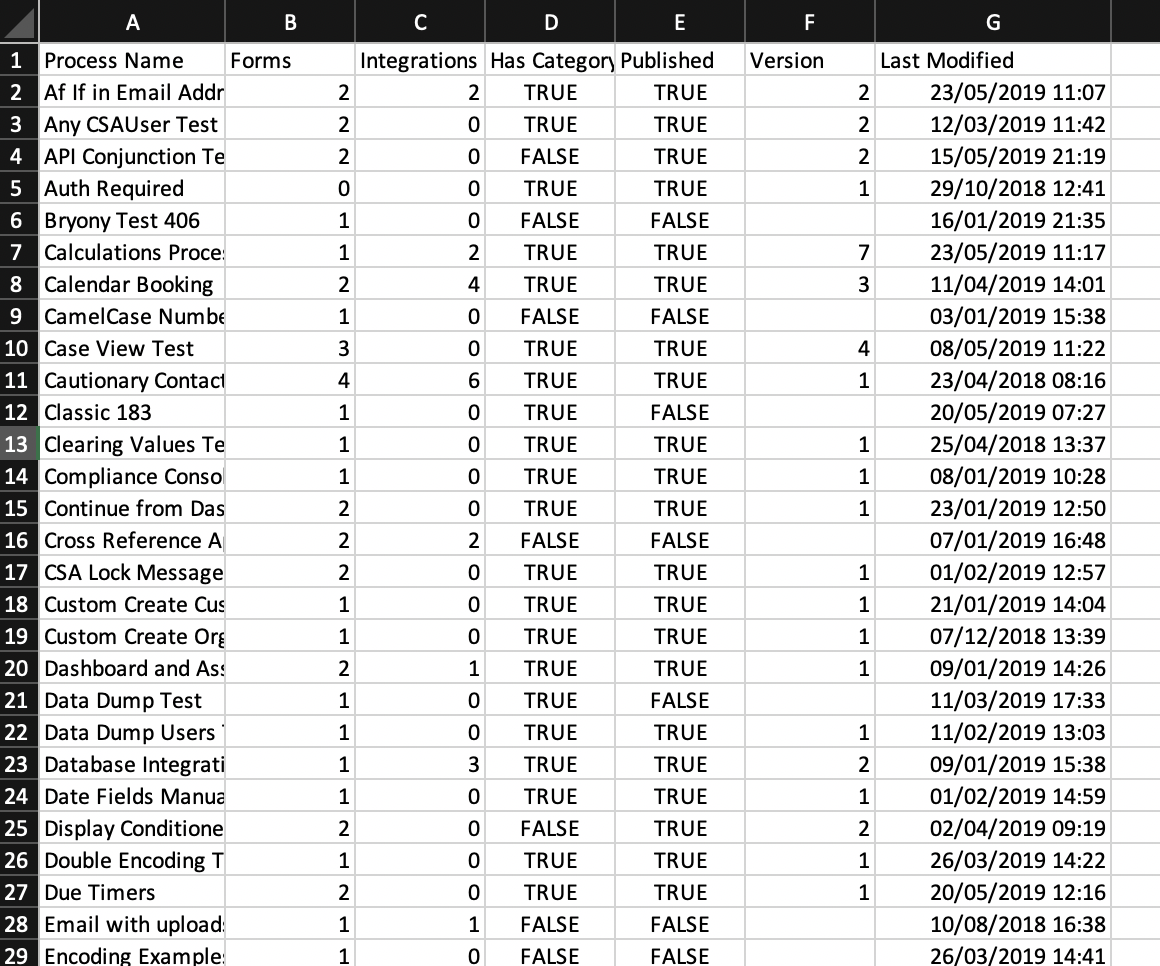Menu
- Introduction
- How Scanner works
- Accessing Scanner
- Navigating Scanner
Introduction
The Firmstep Process Scanner (simply, ‘Scanner’) is a powerful tool which makes it easy to manage the processes, integrations, and users on your platform.
Developed in collaboration with Nottinghamshire County Council, Scanner provides you with an intuitive overview of your forms, processes, integrations and permissions. This insight will allow you to continue to innovate with Firmstep whilst increasing confidence in your development process.
With Scanner, you will be able to:
- keep track of where your integrations are being used in the platform;
- clearly see what forms are using specific subforms;
- oversee the number of users that can access different processes
- export key data about processes, forms, integrations, users, and user groups; and
- monitor product usage to help organise your forms and processes.
How Scanner Works
Scanner runs a periodic 'scan' of all the processes, forms, categories, integrations, and users that exist on your platform at the time of the scan.
Timing of the scans
It is important to note that Scanner does not display in real time. Rather, it displays the relevant data that existed in your platform at the time of the latest scan.
Scan frequency is approximately once every 24 hours. The consistency of this timing may vary.
Scanner displays direct relationships only
Scanner currently only displays direct relationships between forms, processes and integrations. If an integration is used in lookups, it will not show up in the Process section of the Scanner results. This is because lookups are stored as a part of the form and not the process. That is also why the process does not display when viewing the integration details.
You would need to go into the appropriate subform on Scanner to view the integration.
The reason for this is that displaying all the indirect relationships can cause issues; we had issues with the UI timing out on customers with large amounts of data previously. ?
Accessing Scanner
Permissions Manager
The ‘Scanner’ permission will need to be granted to the relevant user group(s) in Permissions Manager under ‘Firmstep Products’.
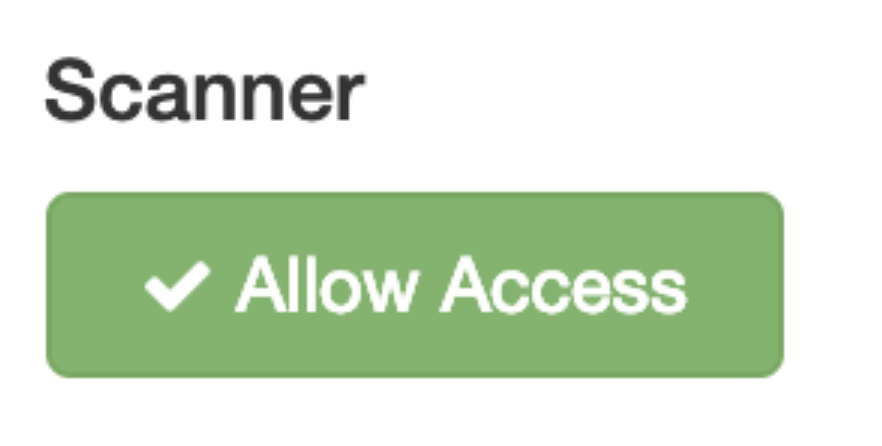
Please Note: Permission to use Scanner should be highly controlled and restricted to Admin users only as this permission grants them access to all processes and data submitted. You should be mindful of any GDPR limitations, especially in respect of sensitive data.
Once permissions have been granted, authorised users will be able to access Scanner using the following link template: yoursite-forms.achieveservice.com/admin/scanner. They will also be able to navigate to Scanner from the admin console areas of the platform. However, please note that the ability to navigate to Scanner in this way is a work in progress and may not yet be available across the entire platform.
Navigating Scanner
Landing Page
The landing page of Scanner displays the date/time when the last scan was run, as shown below:

We are currently exploring options of useful information to display on this homepage. if you have a suggestion or preference of what you would like to see here, please let us know.
Processes
The 'Processes' tab lists all processes that exist in Forms Designer at the time of the scan, as shown below:

The number of forms and integrations that are contained in each process is summarised in the table.
Clicking on a process listed in this summary will take you to a ‘Process Details’ page (shown below) where you can see further information about the specific process. This information includes the list of specific forms, subforms, and integrations in use, as well as the users who have edit and view access to the process. There is also a link in this page which takes you directly to the process in Forms Designer, thereby streamlining your platform management.
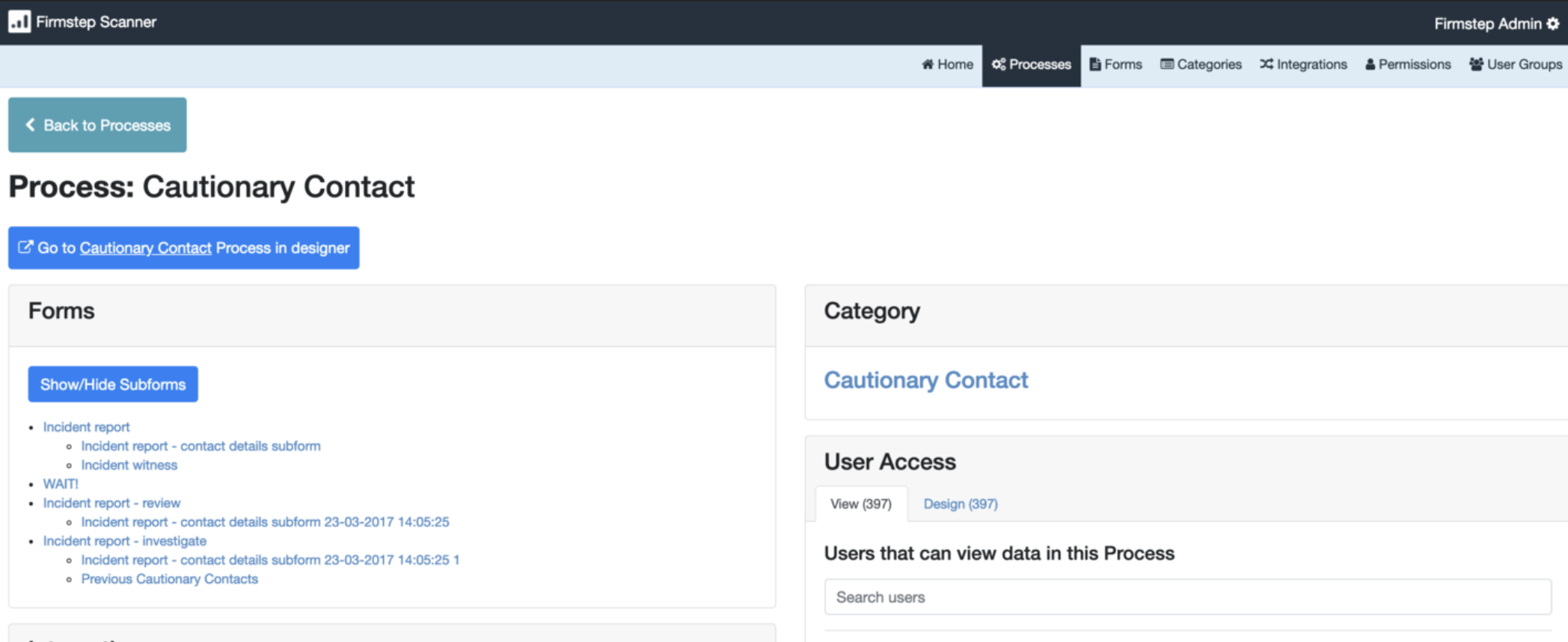
Forms
Similar to the 'Processes' tab, the 'Forms' tab lists all forms that exist in Forms Designer at the time of the scan:

The number of subforms a form contains is summarised in its entry for the 'Child Forms' column. If a form is being used as a subform, this will be denoted in the ‘Parent Forms’ column, which also indicates how many forms are using it as a subform.
Clicking on a particular form will display further details about the form (as in the image below). You will also be able to see if the form is using integrations v2 and if the form is within a process that is assigned to a category.
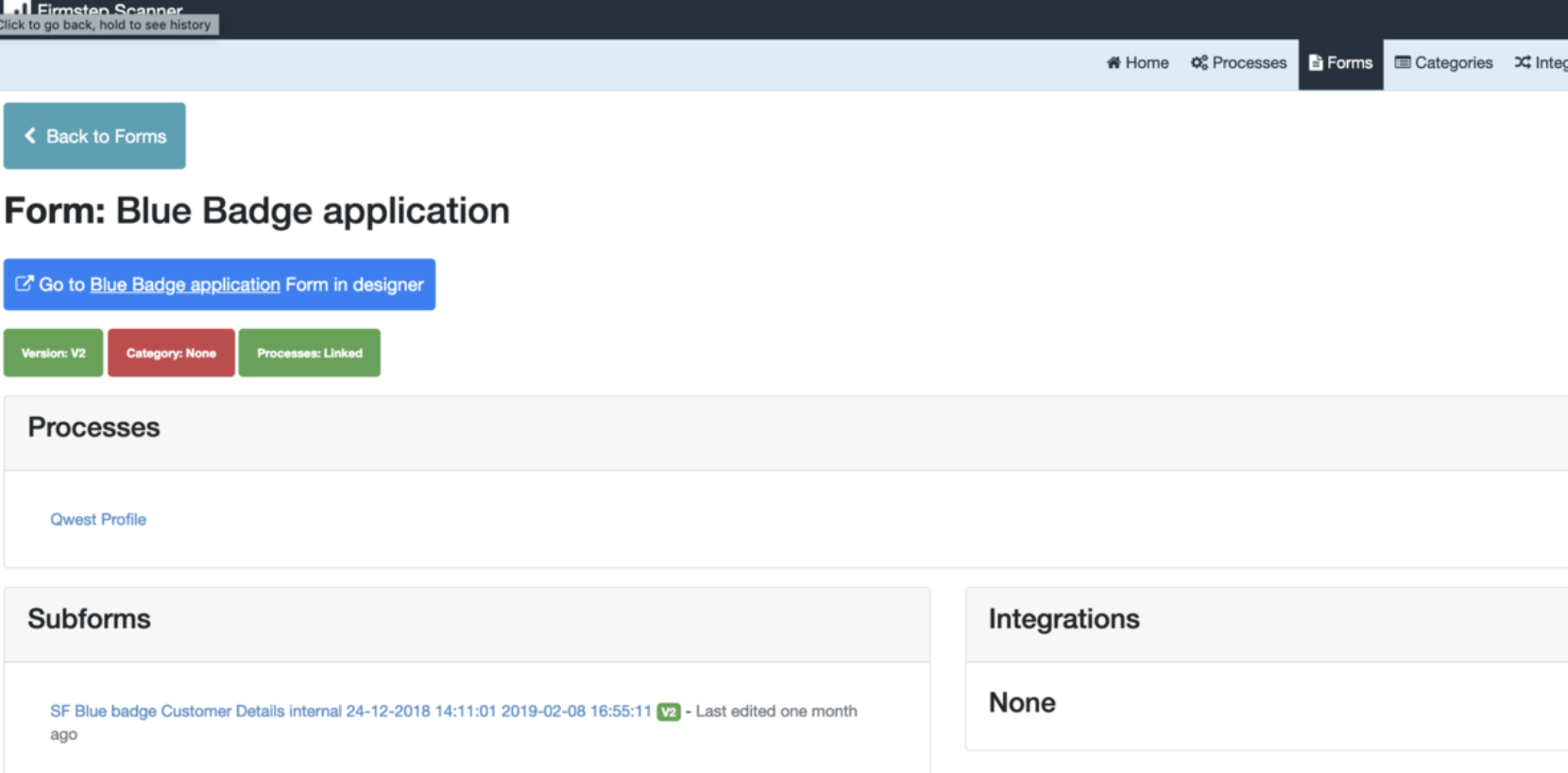
Categories
The 'Categories' tab displays a list of all categories in Forms Designer at the time of the scan. You can easily find and sort categories that have no processes and edit/delete them as necessary.
Clicking on a category will not only display the forms and processes the category contains, but also a list of all users that have permission to edit/view the processes and forms in this category.

Integrations
Similarly, the 'Integrations' tab lists all the integrations in Integrations Manager at the time of the scan. You can quickly find and sort the integrations that are not attached to any process. Clicking on an integration will list all the forms and processes where the integration is used.
Permissions
The ‘Permissions' tab summarises the number of users with access to the primary admin areas of the platform, as shown below. You will also be able to expand each of these categories and see the full list of users with each permission. This is very useful for auditing purposes.
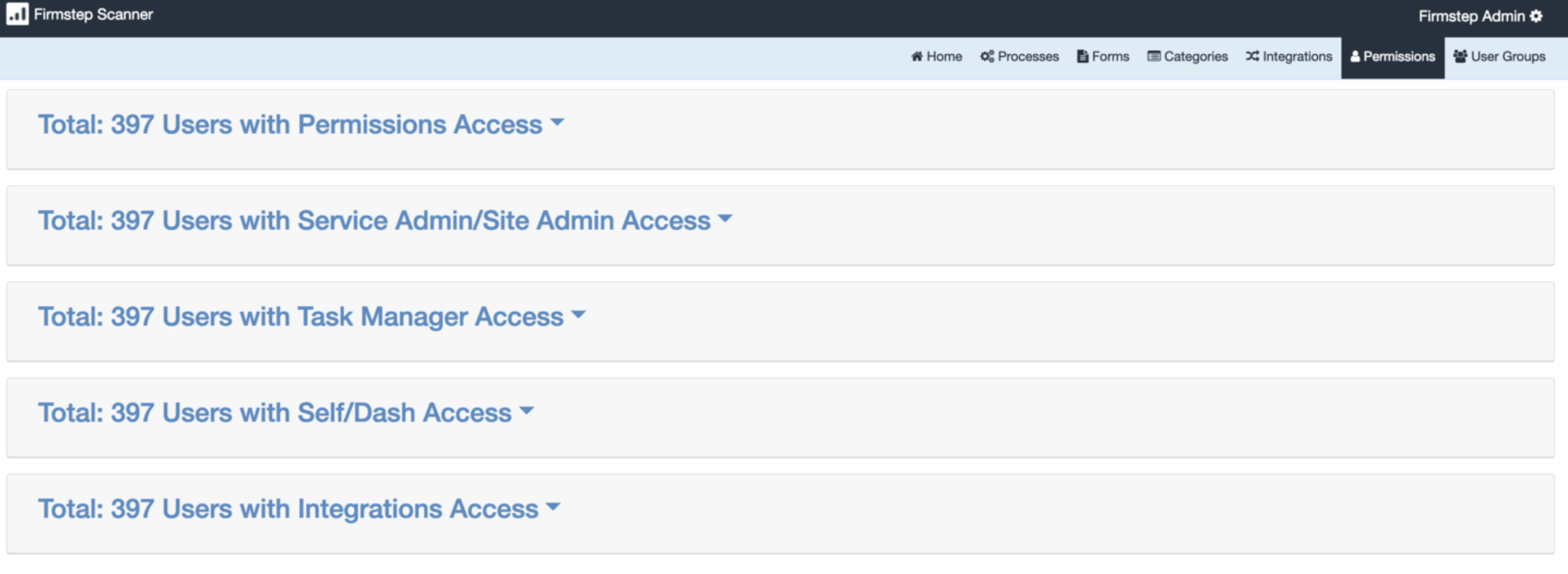
User Groups
The 'User Groups' tab provides a list of all the user groups in the platform and displays the number of users in each group at the time of the scan.
A button is present on the User Group tab to download a zip file containing csv files listing users , user groups, mappings between user and user groups and a list of permissions.

Reporting Dashboard
In Release 425, we added a Reporting Dashboard to Scanner. This displays a summary of the data collected by Scanner, in a readable format, and accessible via the Scanner homepage.
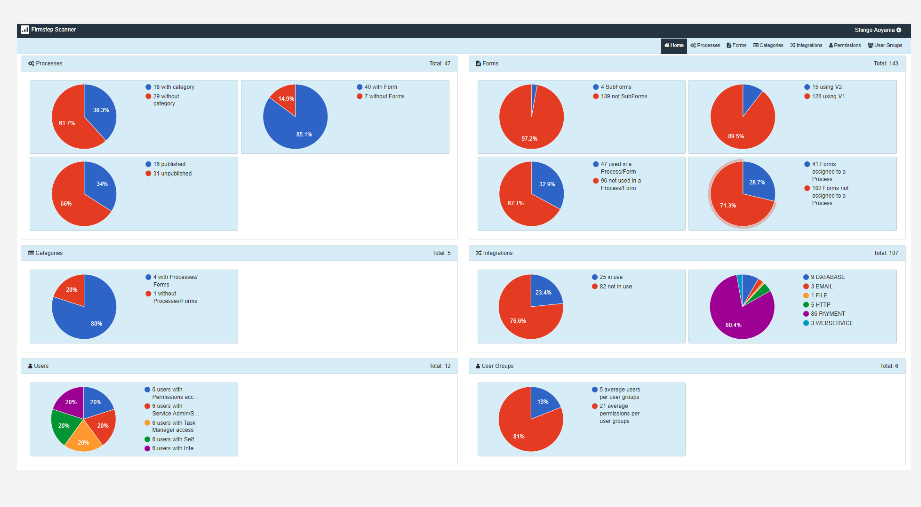
Export functionality - Note
Export buttons are visible on the top right of the Processes, Forms, Integrations, Users, and User Groups tabs. These allow customers to export data in a CSV format, meaning they can then build custom reports.
